Just like some human babies, the cocker spaniels can be picky eaters, and that’s why following the best diet for cocker spaniels is a deadly serious thing. To ensure that your pet receives the nutrition that his little body needs, the optimal Cocker Spaniel diet should include a balanced routine of healthy foods. A balanced diet can help your best buddy live a longer, healthier, and happier life and keep him in shape. In this blog, we’ve discussed the best diet options for your Cocker Spaniel.
Most of us would bring a Cocker Spaniel to our home because of its sweetness, but not all of us would take the time to understand their unique demands. Before it is too late for your cocker you should be asking yourself – what food should I feed my Cocker? How frequently do they need to be fed? What are the best food options for them? All of these can be answered just by following the Cocker’s needs in their diet.
But how to understand Cocker’s Dietary Needs?
Following a Cocker Spaniel food chart would be easier for new pet parents. To make a chart you can take help from the vet. According to your pet’s age, size, activities, and breed, their diet chart can be made.
Moreover, to ensure that your dog consumes a diverse range of foods, the ideal diet for your Cocker Spaniel must include proteins, carbohydrates, fats, fiber, vitamins, and minerals.
Because there are so many different dogs treats on the market, finding the optimal diet for a Cocker Spaniel can be difficult. You will discover how to feed a Cocker Spaniel a nutritious diet in this post. Additionally, you’ll be aware of the proper time and quantity of dog food to provide your Cockers.
Why It is important to follow the best diet for Cocker Spaniels?
Any diet you give your puppy needs to be well-balanced and contain all the necessary nutrients, both for early development and later maintenance. You should give your puppy exactly the same food that he was eating while staying at the breeder’s house when he first arrives at your house and during the early, formative phases. By feeding the puppy the same food consistently, you will first lessen any likelihood of the puppy developing any issues. Because a puppy’s stomach is delicate, if you suddenly change his diet, you run the risk of causing an upset stomach, loose stools, and other issues.

With a balanced, nutritious diet, your pet’s immune responses can be strengthened, his bones can be strengthened, and his muscles can be developed into a well-toned shape; this will also improve his general health.
A balanced Cocker Spaniel diet has numerous health advantages, including the following:
- enhancing and safeguarding your Cocker’s immune,
- safeguarding him from disease,
- assisting in the reduction of food allergies,
- developing strong bones and good muscle tone,
- promoting healthy digestion and excretion, and
- preserving the skin and shine of your Cocker’s coat.
An Ideal Cocker Spaniel Diet
The ideal diet might be the best diet for Cocker Spaniel and it should contain protein, carbohydrates, fats, and fiber with vitamins, and minerals. Because Cocker Spaniels are apt to gain weight, it’s important to study their diet and control your calorie intake!
Skin, ear, and coat issues can occur in cocker spaniels. An organic, healthier diet can help with them.
Natural diets for cocker spaniel
Diet and pet health are closely intertwined. Veterinarians claim that when dogs consume the diet they were designed to consume, they have fewer health issues. Infections and unpleasant odors in the ears, as well as allergic skin and stomach reactions, may be resolved in cocker spaniels. The popular fillers maize, wheat, and potatoes can cause allergic reactions in Cocker spaniels since they are particularly prone to allergies. With a natural diet, these unhealthy foods can be eliminated.
Food from the store
Prepackaged natural food may be a wonderful alternative for owners who wish to transition to a more traditional diet but don’t have the time to make their own dog food. Look for meals that don’t include preservatives or fillers. No meat byproducts or vegetables, but meat or fish should be the first few ingredients. Select goods with short ingredient lists that include ingredients you are familiar with rather than those with lengthy lists of additives and food coloring.
Raw Foods
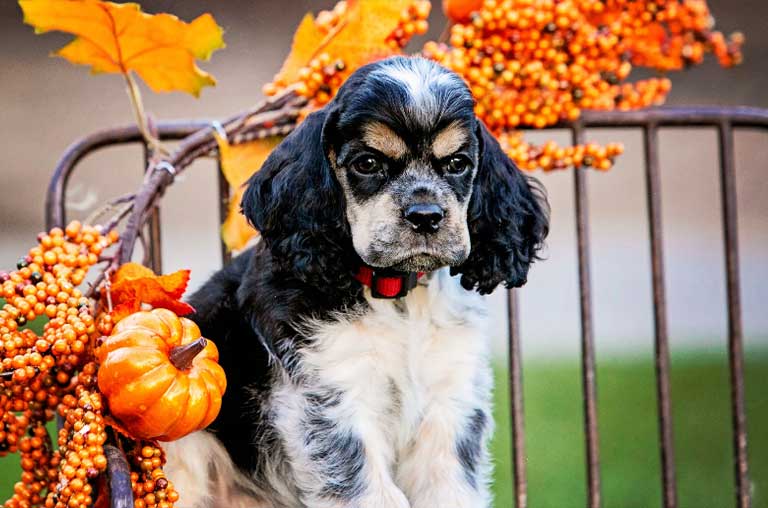
Though somewhat contentious raw food diet for cocker spaniels has been accepted by certain vets and canine rescue organizations. For instance, the Illinois Cocker Rescue feeds its cocker spaniels a raw diet. The main components of the meal are raw, meaty bones, which are healthy for dogs to eat unlike cooked bones and muscle meat like ground beef. Typically, roughly 5% of the diet is made up of organ meats such as hearts and livers. Additionally, some pet owners decide to feed their dogs pureed fruits and vegetables.
Homemade food for cocker spaniels
Specific recipes can be found in numerous dog books, websites, and vets. Pick a dish with a high protein content and little to no plant or vegetable matter if you want to find the proper recipe. Rice should only be fed in modest amounts if it is in the recipe. Never give cooked bones to dogs, not even as chew toys, and keep an eye on your dog’s tummy if you switch up the menu.
What to feed a cocker spaniel puppy
A pre-mix food called Canine Health is used as a foundation to prepare nutritious, prepared meals for pups, adults, and elderly dogs. To find out the best diet for Cocker Spaniel Puppy you have to look for food that has the following qualities included –
- easily absorbable
- attract reluctant eaters
- ideal for dogs with failing kidneys or poor kidney function
- Real food without any horrible artificial tastes, colors, or preservatives
- Made to have control over how many calories and protein your Cocker Spaniel consumes.
- Easy to prepare. After adding warm water, it takes only eight minutes to be prepared.
- An all-in-one product. Whatever meat or protein your dog wants can be found in it.
- Unlike kibble or canned food, every meal is a fresh, complete, and healthful experience.
- Each ingredient is pronounced and is healthful and suitable for dogs.
The mainstay of your Cocker Spaniel dog’s diet should be premium, nutritionally balanced puppy food. However, never feed your puppy any meat that you wouldn’t give to a human being. You could also want to introduce them to fresh, lean raw meat.
Cocker Spaniel Puppies Feeding Guide (2 to 12 months):

Within the first four weeks of life, a Spaniel pup will rely on its mother for sustenance. However, while weaning, gradually introduce solid food. A Cocker Spaniel pup owner can pick from a variety of dog foods. It doesn’t matter if it’s dry food, wet food, organic dog food, a raw food diet, or even a combination of these.
Your developing puppy should live longer and have a robust immune system against hazardous bacteria if its diet is of good quality and contains all the nutrients it requires. The feeding schedule that is provided here is specific to a Cocker Spaniel puppy. It has the necessary caloric content.
The amount of food that a puppy eats depends on its age, weight and brand of food. The meals quantity and amount that a pup should receive relies on its age:
- For 2-4 months — 5 meals;
- For 4-6 months — 3 to 4 meals;
- For 6-12 months — 2 or 3 meals.
Healthy puppies who consume high-quality food don’t require any additional supplements.
Adult Cocker Spaniel Feeding Guides ( 1 to 6 years):
A growing puppy will require more nutrients and minerals to develop into an adult dog. Once a Spaniel turns one year old, start introducing adult food gradually. As long as it contains the essential minerals and vitamins your Cocker Spaniel needs, any brand of dog food will do. It is advised to feed your fully grown Cocker Spaniel three meals every day.
Adult dogs do well with two meals per day, constant access to clean water, and no human-processed food should be made sure.
Buyer’s Guide: Finding Good dog food for cocker spaniels
To assure you are providing the best diet for cocker spaniel, the following considerations should be taken into account when selecting an industrial feed:
Whole meat should be the primary element in your dog’s elevated meal (chicken, turkey, salmon).
Calcium: Cockers are susceptible to a number of different bone issues. To avoid bone displacement and other joint issues, calcium is crucial.
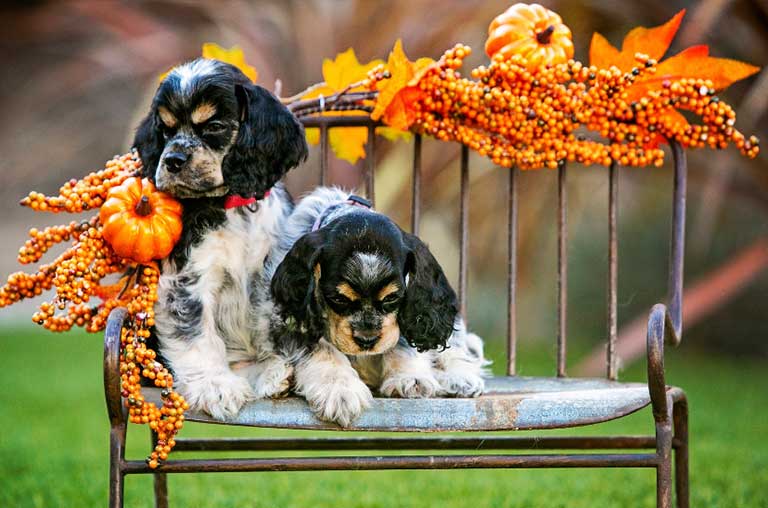
Antioxidants: Fruits are indeed a great source of these protective compounds. They should unquestionably be a part of your dog’s diet to boost its immune system.
Omega-fatty acids: Omega-3 and Omega-6 fatty acids are required to keep the coat’s lustre. Typically, they are a great source of fat or fish.
The following items ought to be on the dog’s menu if you give your pet natural food:
Meat. Given cooked and boneless, the meat.
Fruits and vegetables: Carrots, pumpkins, cucumbers, turnips, and zucchini are all good vegetables to feed the cocker. As an additional source of nutrition, you might include chopped greens. Because they are high in sugar, fruits can be offered as a reward in moderation. Give your pet a slice of apple, melon, or watermelon as a treat.
Offal: a maximum of twice or three times per week.
Dairy goods: Cottage cheese, kefir, and different types of cheese must be a part of the cocker’s diet. An adult pet may experience laxative effects from whole milk.
Eggs: Soft-boiled eggs are advised to feed once or twice a week.
Ingredients to Avoid
Boiling marine fish will add variety to the pet’s diet. Giving fish containing bones to your pet in uncooked form is not advised. You cannot give these dogs river fish to eat.
Bones are harmful to spaniels. Spaniels should avoid bones since they might hurt internal organ tissues and cause constipation, intestinal perforation, and other health problems. Additionally, using bones might cause tooth enamel to grind.
It is not advised to feed cocker spaniels foods like bread, spaghetti, sausages, pastries, beans, potatoes, and sweets. The introduction of cabbage into the diet is permitted, but only after heating it up or as sauerkraut. It is preferable to give up on broccoli entirely.
It is crucial to realize that the most important factor in choosing a pet food is ensuring that it is right, balanced, and healthful.
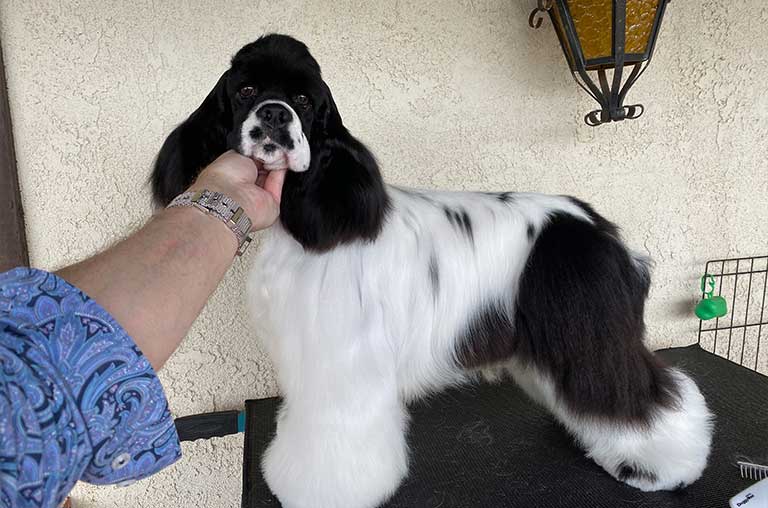
The list of forbidden foods includes:
- Fruits that have citrus in them,
- sweets,
- smoked meats,
- beans,
- potatoes,
- salty, spicy, and fried foods
Wet Food vs Dry Food
Dry food is frequently given to pets in modern society. We advise you to use premium quality Cocker Spaniel dry foods, as well as specialized food for allergic pets.
Around three weeks old, puppies start eating solid food. Otherwise, the small puppy won’t be able to consume it because the food isn’t wet and soft enough.
You can add wet food to a dry diet or serve it as a treat.
Comparing the quality of canned dog food and dry dog food
- Wet food increases moisture content: If your dog doesn’t sip as much water as it should or if they are suffering from a health condition that could aid from accurate hydration, wet food could be a smart option. A dog with a history of kidney or urinary problems is an example.
- Wet food could be easier for dogs with dental issues or other oral anomalies to chew over dry food.
- Food enrichment: Kibble is simpler to incorporate into slow feeders and food puzzles that could enhance a dog’s quality of life by stimulating their minds.
- Benefits for dental health: Chewing their food when eating dry food enables dogs to avoid tartar accumulation and subsequent periodontal disease.
- The dog needs to reduce weight: The moisture content of canned dog food might result in additional volume being occupied by the same amount of nutrients (on a dry matter basis). This will help your dieting dog feel satiated more quickly.
How to Mix Wet and Dry Dog Food:
Another way that can offer the best diet for cocker spaniels is by mixing wet and dry dog food. To avoid overfeeding, it is crucial to make sure you are still giving the recommended daily feeding volume.
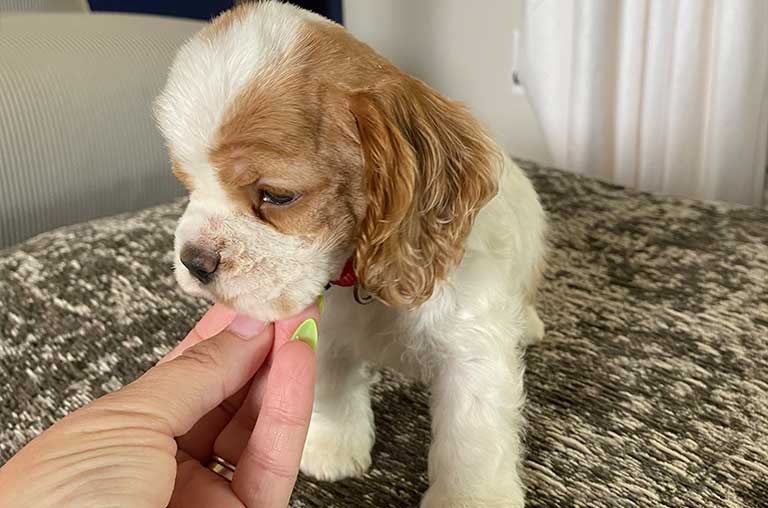
The easiest method to achieve this is to have your pet’s daily calorie needs for maintenance determined by your neighborhood veterinarian. Then you can figure out how many calories your dog needs to consume each day in dry and wet food.
Food Aggression in Cocker Spaniel
Food aggression is nothing but a tendency of guarding food. Whenever a dog is having its dinner or treats, it may exhibit food aggressiveness, which is a possessive response in which they act aggressively to protect its food. Dogs frequently display aggressiveness toward food. One study showed approximately 20% of all dogs, exhibit food aggressiveness.
If your Spaniel is prone to resource guarding, you’ll certainly need to keep an eye out for any recurrence of any dog food aggression warning signs and continue doing some of the exercises occasionally, likely throughout his life. It never really goes off, in my opinion.
Dog Food Aggression Treatment
Only if you are convinced that your Cocker puppy/adult dog won’t bite you and starting to show early signs of dog food aggression then you have to use the following technique. An aggressive dog may suffer serious injuries if food is taken away.
Do not attempt to remove his food from him if there is any question in your mind.
- While your puppy is eating, sit close by. As he finishes, sprinkle some kibble into his bowl from time to time, and gently pet him. Replace your puppy’s food bowl after three to five minutes if he exhibits any signs of dog food aggressiveness during this time.
- Remove the bowl once more and give it another five minutes if he behaves in the same manner.
- Remove his bowl entirely and try again at the next planned feeding time if he continues to act aggressively when you approach him or when you are petting him.
- Your puppy will gradually understand that you are the one who gives him food (but only when he behaves) and that if he acts badly, you will take away his food, and finally, you will stop feeding him.
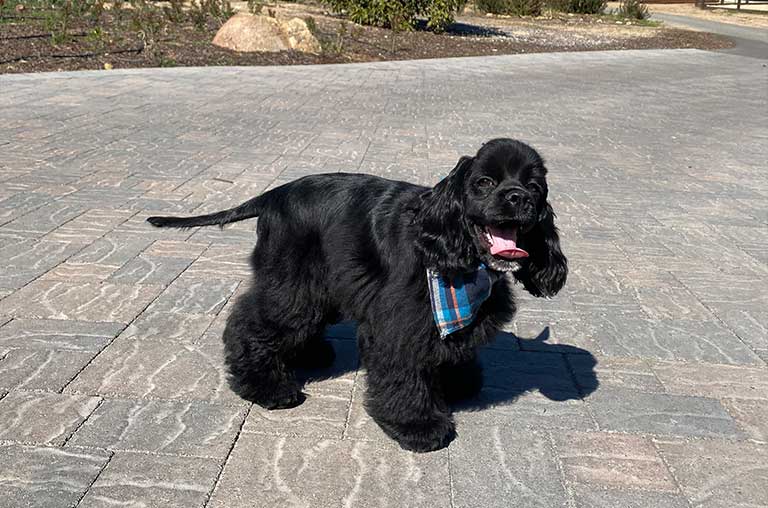
The best food for my cocker spaniel That Is Suffering From Allergies?
Dog foods for Cocker Spaniels with allergies must contain all of the nutrition your dog needs to sustain excellent health, aside from the necessity that they are free of allergies.
Cocker Spaniels, for example, are renowned for their vigor. It is actually thought of as a competitive breed. To retain their fun and great levels of physical activity, they need a significant amount of fiber and carbs to give them the push they need. You may argue that dog food for Cocker Spaniels with allergies has to be high in carbohydrates and fiber.
Additionally, you should examine the amount of fat in the Cocker Spaniel dog food you select. The appropriate amount of fat is important for the Cocker Spaniel to maintain healthy internal organ function hence it must be provided. Additionally, fat deposits are necessary for your dog’s bones to remain robust and powerful.
Hypoallergenic Dog Food
Only natural, high-quality, minimally processed foods with preservatives and colorings are used to make hypoallergenic dog food. Instead of corn or wheat, this dog food may include rice, which is considerably healthier and less allergenic for dogs.
The advice is to try different food brands till you discover the ideal one for your Cocker.
Prior to selecting the best hypoallergenic food for your dog, make sure you have read the dog food ingredient label to ensure that it doesn’t include any harmful chemical preservatives and that it has a good ratio of excellent protein and complex carbs, including vegetables and grains.
Here’s a list of some of the best hypoallergenic food
Solid Gold Hund-N-Flocken Dry Food
A recipe for “Superfoods,” which are produced from non-meat food sources high in vitamins and minerals. Carrots and blueberries, which are high in vitamins and antioxidants, are examples of these “Superfoods.”
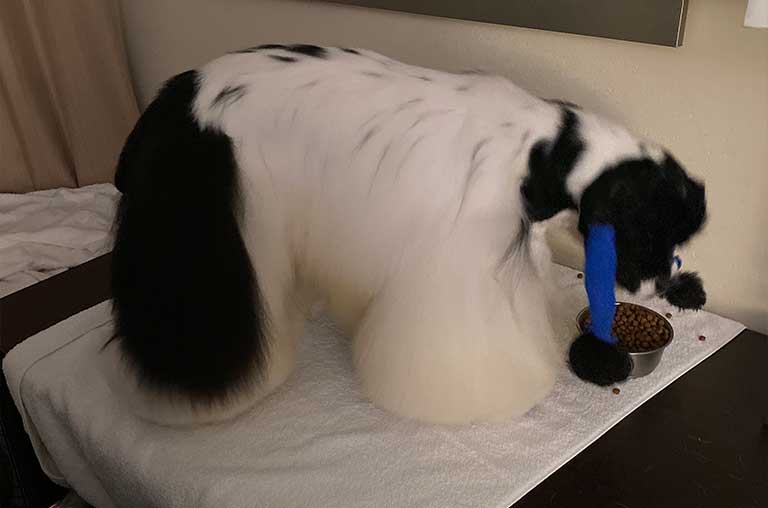
For instance, the Hund-N-Flocken with Lamb & Brown Rice by Solid Gold Dry Food offers protein derived solely from naturally fed sheep bred by the brand, as well as brown rice for that carb punch that’s low on sugar. This dog food for allergic Cocker Spaniels takes pride in being simple to digest for your pet. Additionally, there is no potato in it, but it is still loaded with healthy grains that are good for the health of your Cocker Spaniel.
Canidae Dry Dog Food for All Life Stages
Canidae All Life Stages Dry Dog Food for Puppies, Adults, and Seniors is designed for dogs of all ages. You need not worry about buying different food for the younger or older members of your pack if you have a large furry family in addition to your Cocker Spaniel. Large and little dogs alike can benefit from this item, which makes it the perfect solution for all of them.
Canidae’s dry dog food for allergic Cocker Spaniels was created with the assistance of veterans. You can be confident that this food is completely wholesome and advantageous to the well-being of your furry family. Additionally, it is really affordable.
There are a number of other premium hypoallergenic dog foods that could be beneficial for your Cocker Spaniel:
- Addiction’s Wild Kangaroo and Apple
- Orijen 6 Fish Grain-Free Formula
- Royal Canin Hydrolyzed Protein
- Acana Duck and Bartlett Pear
- Wellness Natural Dog Food.
Choosing Dog food for senior cocker spaniel
Age-related declines in appetite are common. The first indication of something more serious could be skipping meals or neglecting the water dish. Pay attention to your dog’s “regular” behavior and consult a veterinarian if you suspect anything is not right. If your dog has missed more than a day’s worth of meals, it’s time to call the vet. Your veterinarian could recommend an appetite enhancer for a senior dog that needs a little assistance rediscovering an interest in eating after an illness or due to failing health.
How to Get Your Senior Dog to Eat More
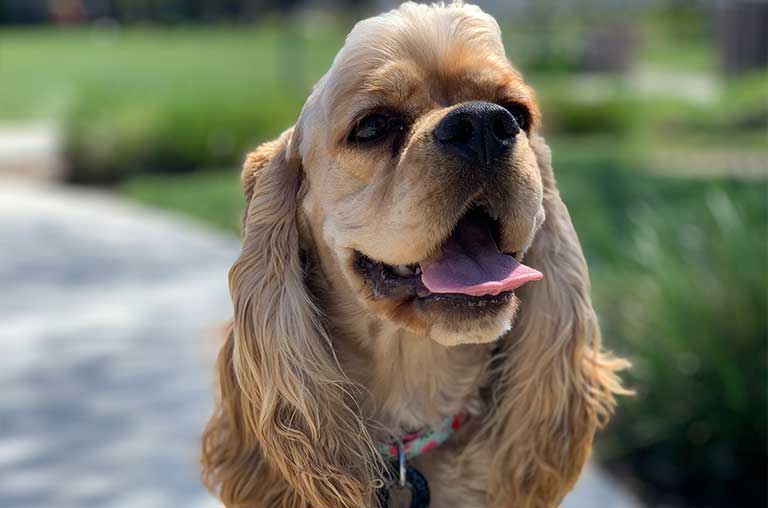
1. Consider mixed feeding
Many animals prefer wet food since they enjoy the taste and texture. Why not try some mixed feeding as an experiment? As a tempting treat, try topping their preferred dry meal with room-temperature wet food.
2. Warm It Up
Dogs prefer warm or room-temperature food that is not hot or cold, so stay away from offering them wet food that is more than a day old from the refrigerator. If you decide to microwave wet food, be sure to check that it is only warm not hot before serving.
3. Initiate a Change
Whenever it comes to their food, dogs normally appreciate consistency, but if your Cocker looks uninterested in what’s in its bowl, try introducing a different flavor to see if the aroma will catch his attention. Introduce new food gradually by combining it with the old meal in equal amounts each day to prevent an upset stomach.
4. Remain nearby
Your dog may find it uncomfortable to reach its bowls if they have one of the common health conditions that affect adult dogs, like arthritis or joint pain. Maintain a dish of water and food on each floor of the house.
5. Continue to Flow Fresh Water
Did you realize that your dog may be avoiding the water bowl because of the smell? Your dog should always have access to a clean bowl of fresh water. Giving older animals enough water can help with digestion and reduce their risk of dehydration.
6. Praise Them
Does your dog realize how pleased you are to see them enjoying their meal? Don’t keep your dog guessing if you notice them eating; instead, give them praise and let them know they’re doing a fantastic job! A powerful motivation to continue the activity is understanding that consuming their meal makes you pleased.
Best Dog Food List
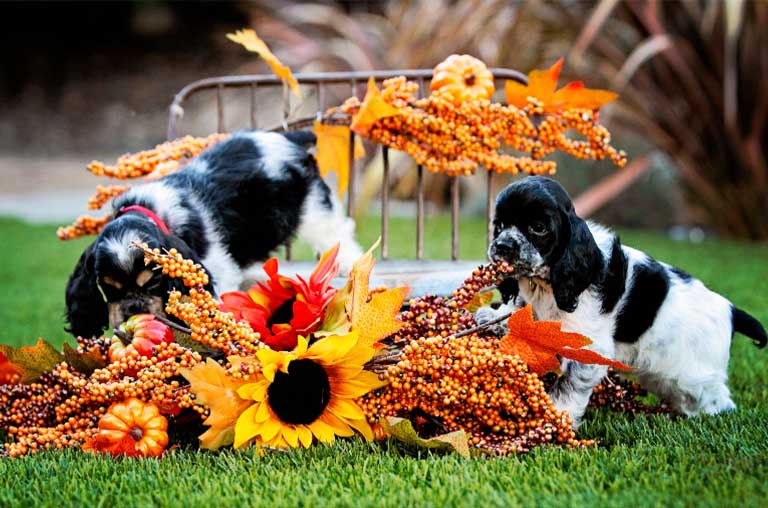
Ready-made dried dog food is preferred by many breeders. Here we have listed some of the greatest options for the cocker spaniel –
The Orijen Regional Red
A great source of both fresh and dehydrated protein. It is a wholesome option that is also delicious. Although fresh Angus beef is the main protein, the recipe also calls for fresh bison, boar, lamb, and organ meats including tripe and liver.
Additional sources of carbohydrates include vegetables, legumes including chickpeas and other beans, and yellow lentils. The formula also contains one probiotic strain to make sure your dog properly digests and consumes this meal, along with herring oil to offer omega-3 fatty acids.
The majority of people who tested Orijen were happy with it, and canines often enjoy the meat-heavy mix. After using this formula, some dog owners saw improvement in their dog’s intensity level, coat quality, and bowel habits. Most owners also prefer knowing that they are feeding their dog food that contains so many various protein sources. This was the best food for my cocker spaniel that he liked.
Royal Canin Adult Dry Dog Food for Cocker Spaniels
This particular Cocker spaniel food is made to specifically match the requirements of this breed. English or American Cocker Spaniels that are adults and of mature age should consume this diet. It makes the wavy coat lustrous and attractive while preserving the health of the skin. The hair coat will shine with health thanks to a special complex of minerals, vitamin A, and omega-3 acids.
Given that this breed is predisposed to weight growth, this formula is also intended to maintain a healthy pet weight. With the presence of antioxidants and certain nutrients, it also aids in maintaining the condition of the heart muscle. With the calcium in this composition, the likelihood of developing tartar in the teeth is decreased.
Merrick Grain-Free (Texas Beef with Sweet Potato and Salmon with Sweet Potato)
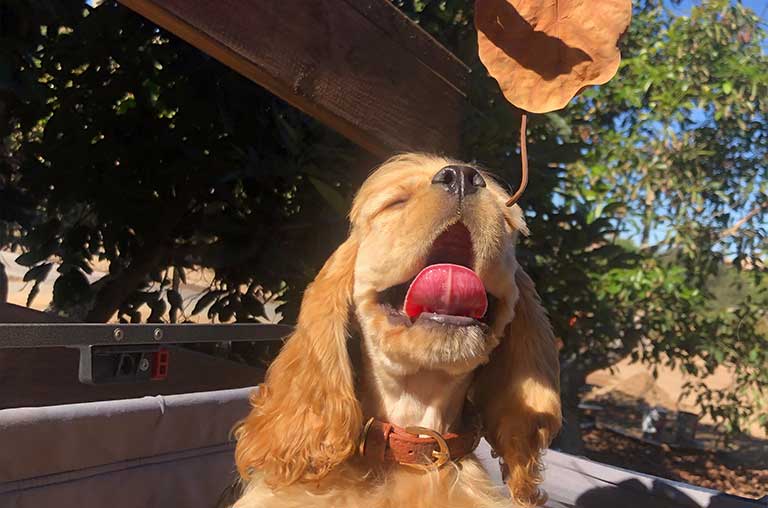
The grain-free recipe from Merrick provides your pet with high-quality, nutrient-rich food. It is completely free of grains and solely comprises a protein diet from meat, fish, or chicken. Fresh farm-grown fruits and vegetables are also mixed into this mixture.
The main component of this meal is real lean beef. This product contains food fiber, nutrients, vitamins, and minerals, and 65% protein and healthy fat. Artificial colors, tastes, and preservatives are not included in the food.
Merrick Grain Free is enriched with glucosamine and chondroitin at industry-leading levels in addition to mineral and vitamin additives, which will aid in promoting joint health. Additionally, four different probiotics are incorporated to promote healthy digestion and prevent intestinal discomfort.
The amazing ingredient list of Merrick Grain-Free Recipe is certain to catch owners’ attention right away. Several high-quality proteins are used in this recipe, including boneless salmon, salmon meal, whitefish meal, and boneless whitefish.
Blue Buffalo Cans Dog Food
You can use Blue Buffalo tinned food as a main course or combine it with other diets to enhance flavor. By using this product, you may give your dog a more varied food while maintaining the health of its digestive system.
It combines special proteins with a reduced carbohydrate content. Each formulation is free of gluten, all-natural, and corn, wheat, or soy by-products. It supports strong teeth and gums, maintains a healthy digestive system, and also encourages a robust immune system.
Feed Me Turkey Freeze-Dried Superfood
It is a premium raw superfood called TruDog’s feed. Ingredients in the formula are straightforward and nutrient-dense. In order to aid in digestion, a little amount of herring oil has been added to the diet, which also contains turkey meat, heart, liver, and minced turkey.
The nutrients are destroyed by the high temperatures used to produce the majority of commercial feed. Because TruDog is less processed, the original nutrients are retained more. Feed your puppy high-quality foods made with protein from natural sources, which is essential for all canines.

FAQs
1. What Should a Cocker Spaniel Eat?
Full, balanced dog food has to be fed to a Cocker to maintain its good health and weight. You need to provide them with a portion of complete dog food that is of top quality and readily available in stores. Dietary items like lamb, poultry, or beef are high in meat-based protein which is required for Cocker Spaniels. They need some fat in their diet to keep their coat shining, and their diet should consist of roughly 60% carbs and 20% protein. They can also eat any premium brand of dog food as long as that is suitable for their age and size.
2. How Many Times Should a Cocker Spaniel Eat?
Cocker Spaniel puppies require more frequent feedings of 3-4 times per day so that their small bodies can comfortably digest food, get the nutrients and calories they need, and helps them to grow steadily. Healthy dogs of 12 months or older, can go without food for 8 to 12 hours between meals. A routine that includes breakfast, lunch, and dinner is likewise a wonderful choice. Your veterinarian should specify the recommended feeding amount for your Cocker Spaniel. The usual practice is to suggest splitting their daily allocation into two meals.
3. What Should Cocker Spaniel Not Eat?
There is some food that is toxic for Cocker Spaniels. These include dairy food, baby foods, vegetables, and a few raw items, and many more. Any amount of dark chocolate and alcohol is highly not appropriate for Cockers. Food that contains fatty acids, avocado, broccoli, onions, and garlic all of these are toxic for Cockers. These toxic foods may not harm them immediately but gradually they will ruin Cocker’s health. Brewing hops, nuts, raw fish and raw eggs, grapes and raisins, cat foods, and bones are also dangerous for Cockers.
4. How Much Should a Cocker Spaniel Eat Per Day?
A Cocker Spaniel puppy should consume two to three cups of food on average per day. A two to six-month-old cocker spaniel puppy should consume about 150 to 250 grams of food each day. After that, cut down on the serving size to between 130 and 190 grams each day for the following five months.
You can offer the necessary adult dog food to your dog after it has reached the age of a year. The dog food must contain all the nutrients required for it to remain healthy and active, with an ideal protein content of 25%.
5. Do Cocker Spaniels Have Sensitive Stomachs?
Cocker Spaniels, are known for having sensitive stomachs. There are many different reasons for gastrointestinal problems in Cocker Spaniels, but fortunately, most of them can be treated naturally at home with a few nutrients or medicines. Due to their delicate autoimmune, Cocker Spaniels frequently appears on lists of breeds that are most susceptible to diarrhea.
Final Thoughts
Always remember to conduct a little study before choosing which foods to feed your spaniel. Check out the suppliers and manufacturers, read food reviews, and make sure you can readily and affordably purchase the food. If you need to alter your dog’s diet and introduce new items gradually remember you must never abruptly change your Cockers diet.
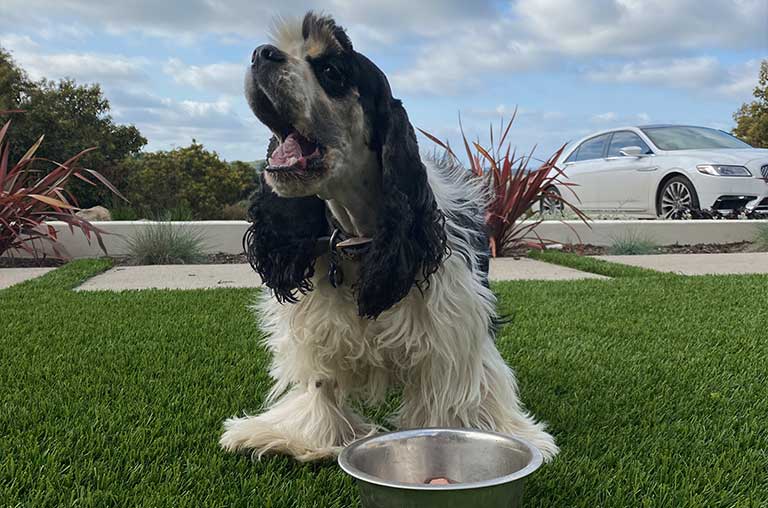
Leave A Comment